Retail App Development: 5 Reasons to Create One for Your Business
Updated 02 Sep 2023
12 Min
4618 Views
Your potential customers use their mobile phones daily to solve certain problems. Just think -- there are 224 millions of active smartphone users over the US, while in the global scale this number exceeds 2 billion. It looks like a myriad of opportunities for your business that you can reach by providing your customers with retail mobile app.
In fact, hundreds of brands already made use of the opportunity and successfully adapted retail mobile apps. That's why we decided to shed some light on this topic and show you several ways of how your company can benefit from an app.
Why website isn't enough anymore?
If you're reading this post, it means you already see the perspectives of apps in business and probably seek for mobile app development services. Going forward, we should say that any retail business is able to benefit from a mobile solution if to plan out a strategy and tailor the app in accordance with the needs of your target audience. In case you're still in doubts whether you need an app if you already have a profitable website, let's take a look at dry statistics.
According to eMarketer research, the number of annual sales in m-commerce segment grows by 5% to 10%. Sure thing, it's not enough just to attract customers to your digital store (be it a website or retail mobile application), you should also motivate them to purchase something. If we take a look at statistics of retail mobile apps in comparison to websites, we'll see the following:
- Mobile shoppers tend to browse 286% more goods if compared to mobile websites.
- Retail mobile apps generate 90% higher add-to-basket rate in comparison to mobile websites.
- Total conversion rate on mobile apps is 120% higher if compared to retail websites.
These statistics provided by PR Newswire, clearly shows that mobile apps for retail industry are able to engage customers better than websites and generate more profit for business holders.
Except for everything I've already said, there is one more reason to think about retail software development services. There are about 2 billion of active smartphone users each of whom is your potential customer.
As you understand, demand generates supply and in order to compete, you should adapt your business to customers' preferences.
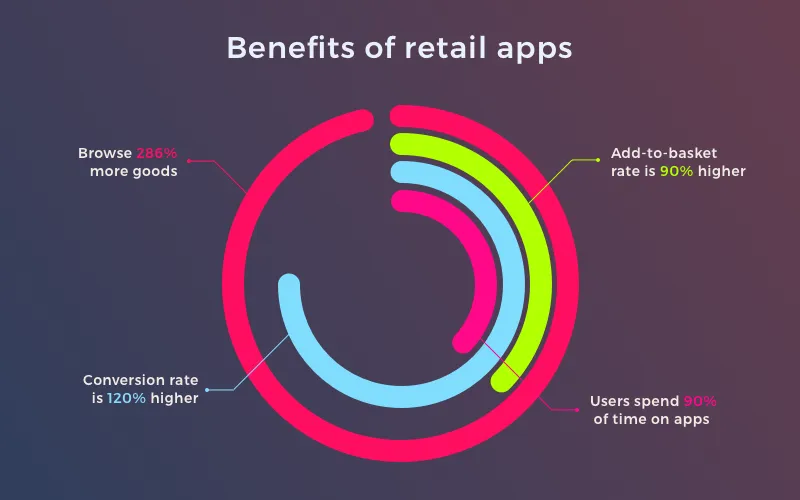
Retail mobile app statistics
More reasons to create an app for retail business
If you still feel a lack of reasons to implement your own application for retail business, let's then dive deeper and consider separate scenarios on how you can benefit from it.
1. Boost your sales
Well, back to numbers. The survey conducted by Apptentive indicates that 88% of customers downloading retail mobile apps actually use them. Moreover, 54% of interviewed people said they made a purchase there in the last month. By the way, if resort to different kinds of loyalty programs and other marketing tricks, you can even outperform this result.
This way, such retail platform as Alibaba gets the highest profit ($24 monthly per an active mobile user) from mobile shoppers.
2. Be up-to-date
Look around and you'll see that many medium-sized and even small companies in automation in retail already have an app or working on it's creation. The report by ContactIQ proves it showing that 62% of respondents are about to release a retail software application or already rolled out one.
Such a tendency clearly shows that customers over the globe are fond of the idea to purchase goods through eye-catching and easy-to-use native apps instead of mobile version of websites. The market dictates it's own rules and you risk to lose a big piece of cake. Why? 46% of people interviewed in AYTM's survey said they prefer purchasing through retail mobile apps than on websites.
This bunch of people may choose another store that already has it's own retail store app. I suppose that you don't want to lose all these customers. The best way to avoid it is to try to meet their preferences and needs.
3. Build brand loyalty
Retail mobile apps can serve not only for achieving certain financial goals but for building brand loyalty as well. Many big companies develop their apps for this reason.
Loyalty programs can bring your customers everything they love -- special offers of different kinds. Let's consider a couple of the most popular solutions that brands endow it's retail apps with in order to generate more loyal customers.
Gamification
More and more retailers pay their attention to this marketing trick in their retail sales apps. To be more concrete, the survey provided by BRP shows that 87% of retailers plan to apply gamification for engagement purposes in the next five years. Besides, 46% of them say that a loyalty program containing gamification elements is a high priority for them. The possible list of these elements is limited only by your imagination. Probably, the most popular one is kind of currency imitation. Or, for example, with generative AI in retail, you can power dynamic gamification in retail, where each buyer gets personalized challenges and product missions that adapt to their behavior in real time.
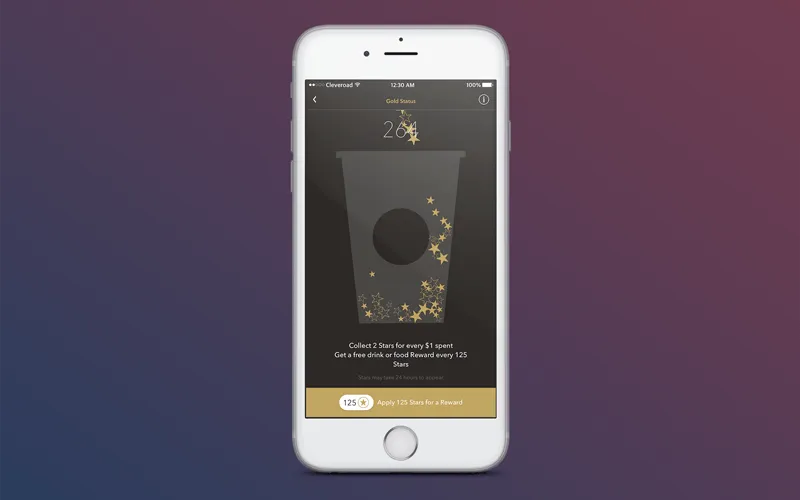
Retail mobile app ideas: Starbucks loyalty program
Coupons
That's another popular way of building brand loyalty. Let's be honest who doesn't like gifts and discounts? I think you won't find such a customer. So, usually, it's quite effective method to attract new users. Again, the way you'll implement it depends only on your imagination. You can give coupons to users who invited their friends to the app or, let's say, give it for no reason but just to attract attention to the new product or increase sales of the old one.
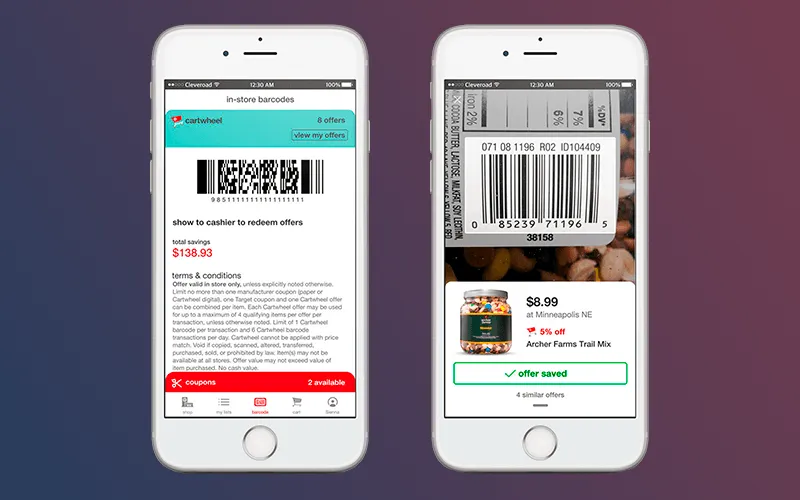
Retail mobile app trends: Coupons
4. Hook more potential customers
As I already said, retail mobile apps open up the doors to hundreds of thousands of potential customers. Guys from Apptentive decided to shed some light on this question. In accordance to their report, retail apps are in active use among both men and women -- 44% and 56% respectively. Meanwhile, the average salary of retail apps users ranges between $50,00 to $75,000 annually.
Still have no clue who is your target audience? Read our article on how to define it and build an app meeting audience's needs
Talking about age, the age category of 18-29 years old prevails as expected and holds 27% of the total users. Surprisingly, the second largest age category is 60+ years old that holds 26% of the total number of retail apps' users.
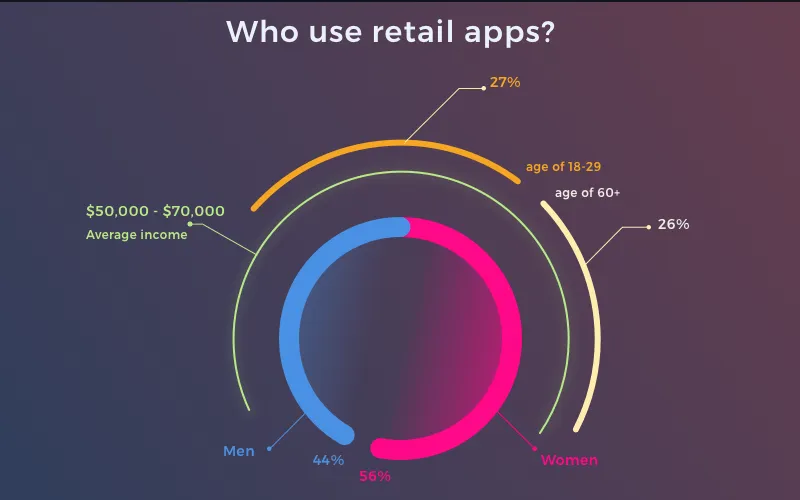
Audience of mobile applications for retail industry
5. Make in-store experience better
51% of clients use retail store mobile applications while purchasing stuff in physical stores, so if you guess that your app and store are something incompatible -- you're wrong since they're rather parts of the same whole. Bearing this thought in mind, you are able to make them interact and work together. Underneath, we've placed several features borrowed within diverse retail app development solutions which may help you to come up with your own ideas or just polish the existing ones.
Beforehand order & payment
This feature allows your customers not to waste their time on checkout lines. Users can order and pay for goods on-the-go and then pick them up right in store without any delays. Such a practice is successfully adopted by Starbucks company which by the way managed to increase it's revenue after the introduction of this feature.
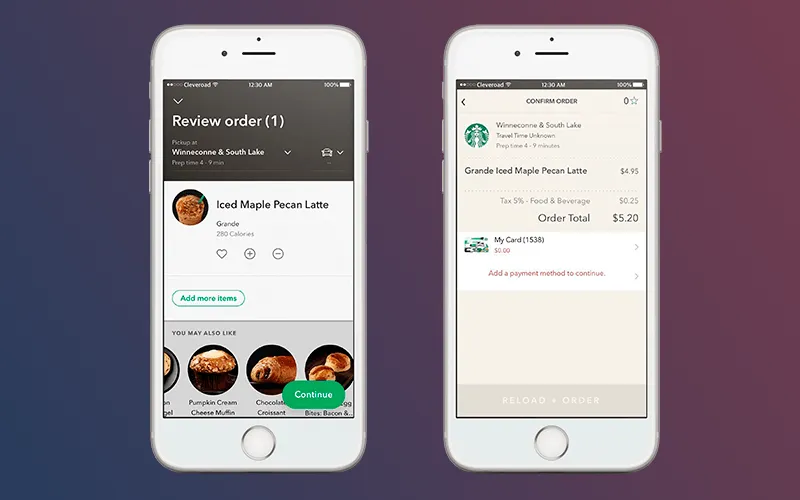
Best retail app features: Beforehand order & payment by Starbucks
QR-code scanner
Why do you need this feature in your retail store application in 2017? Because sometimes it's impossible to place all the necessary product information on your shelves. At the same time, there are clients who prefer studying product information carefully before purchasing it. With the help of QR-code, they'd have an opportunity to conveniently read all the details and make a decision.
Geofencing
iBeacon technology allows you sending notifications to visitors as they getting closer to your store. For this purpose, you should buy a specialized device called iBeacon and place it in your store. With it's help, you can just say hello to visitors or notify them about current discounts and special offers.
Must-have retail mobile app features
We've already provided you with the list of retail app features that are used by other companies. It's time to dive deeper into this features, consider closely several more of them, and give you more piece of advice.
Create great catalogue
One of the main reasons why customers strive to use apps instead of websites for shopping is the well-organized and convenience catalogues of goods. That's why you should take care of your app's UI/UX design in general and the attractiveness of the catalogue in particular. Here are several plain tips on how to make your catalogues better:
- Use only high-quality photos of goods
- Write detailed description to products
- Categorize your products
- Keep the catalogue up-to-date
- Inform customers about product's availability and approximate arrival date
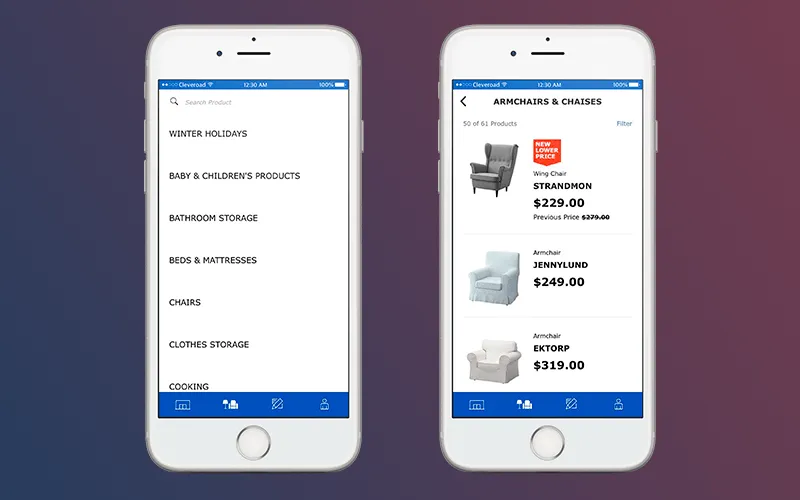
Mobile application for retail store: Categorization and catalogue in IKEA app for iOS
Add smart search
If you want to offer your customers hundreds of products in your app, you should take care of search opportunities. With artificial intelligence in retail, you can make your in-app search fast and flexible so users could reach goods they're looking for with minimum efforts. In another case, there is a probability that some of them will leave your app without making any orders.
Take a look at the retail mobile application by Zappos, where they've implemented the opportunity to search for items by using emojis. That may seem like the useless feature but, in fact, it helps to engage users and may affect on your app's lifetime value metric.
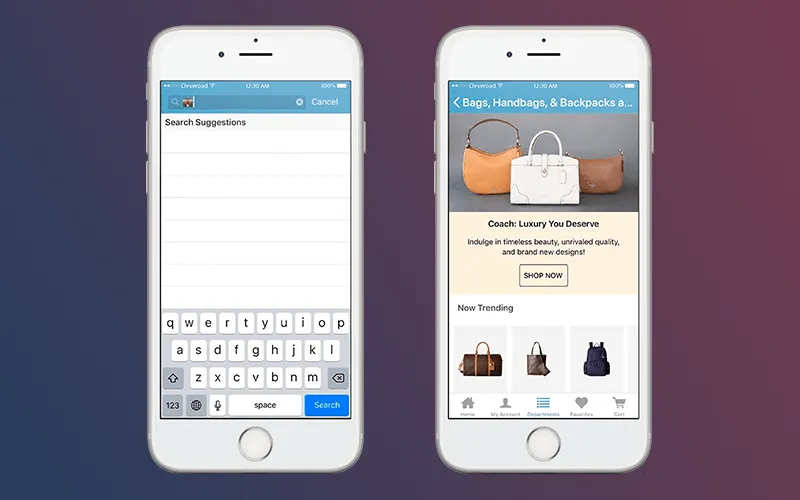
Innovative retail apps: Zappos app for iOS
Filter your goods
Filters allow your users to narrow the list of goods they'd like to see. This way, they can choose parameters like size, color, shape and so on to see only those items that correspond their preferences. Besides, you can sort your goods by popularity, price (from lowest to highest and vice versa), brand etc.
By giving users such options in your app for retail business, you increase the probability that the product they're searching for will be found and bought through the app.
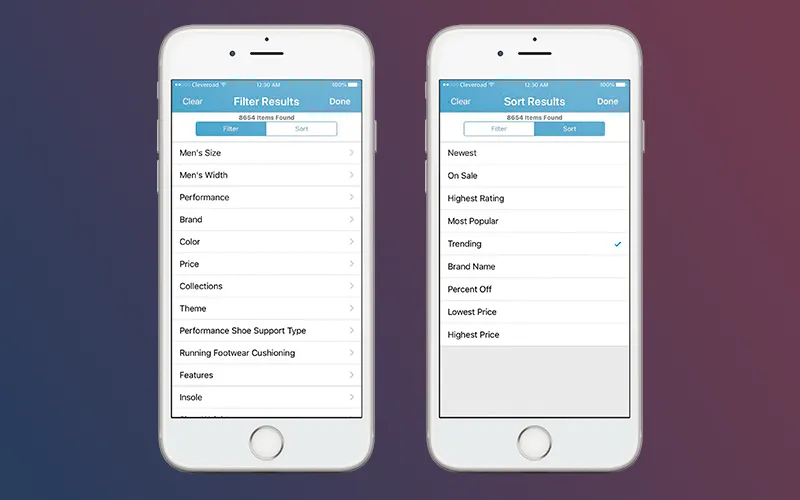
Best retail app features: Zappos app for iOS
Make great checkout & payment
After users added all the items they want to buy to the cart, you should give them an opportunity to check the total price (including tax and shipping) for their goods before charging funds. Keep the UX of this screen simple and eye-catching in order customers weren't faced with any troubles before purchasing. In other case, you can lose a part of them.
Can't decide how to secure payments processing for your business? Let us help you in this tough decision
Also, watch our video on how to integrate a payment gateway into an app.
Moving to payment, except for ordinary credit card we can suggest you to add payment systems like Apple Pay or Android Pay. They are a perfect fit for mobile shopping.
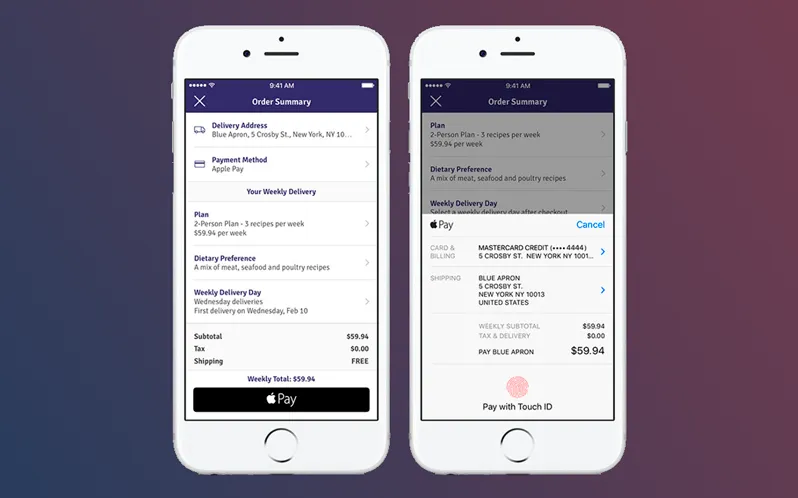
Best retail app features: Checkout & payment in BlueApron app
Create profiles
Profiles in retail mobile apps intended to give users an opportunity to change and save their personal information rapidly. Besides, they allow participating in loyalty programs and getting personalized discounts and offers.
However, it's not all rosy. The point is many users don't want to remember one more login and password, so they refuse to register despite all the bonuses you propose. The most reasonable way out is to propose them signing up via social networks. Both sides benefit -- you get an active user, while a customer has no headaches with logins and passwords.
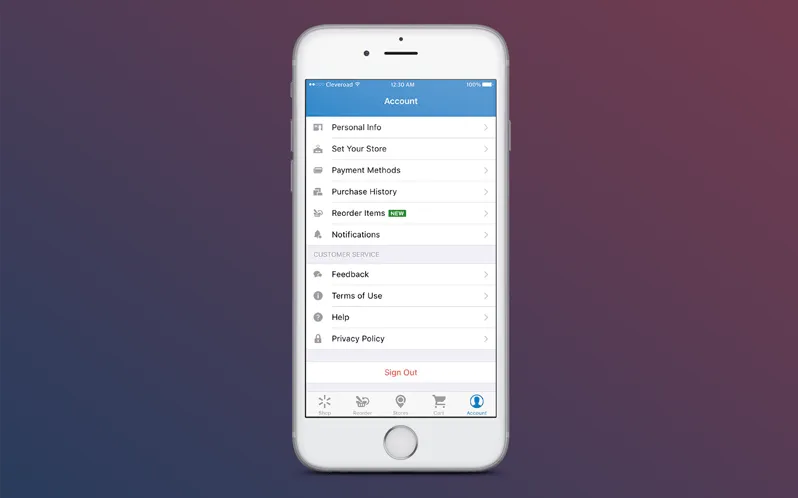
Best retail app features: Walmart app for iOS
I hope we covered all the point you were looking for. Subscribe to our newsletters by filling the form on the right (or at the end of the page if you browse through mobile) and get our updates delivery on email!
In case you want to start the retail mobile app development for your business -- contact our managers. They'll tell you more about our company and answer all your questions.
To make a retail app, you need to conduct detailed research of your audience. Based on this research, you will create a UI/UX design of your app and draw up a feature list. Here are the main features that you need to include in a retail app:
- Catalogue
- Smart search
- Search filters
- Checkout and payment system
- User profiles
Retail mobile app development is essential for retail businesses due to the significant advantages that it brings to the company. Here are some of them:
- Retail apps boost sales
- Retail app development shows your customers that your company complies with up-to-date trends
- Retail apps help to build brand loyalty
- They help to attract new customers
- In-store experience becomes better
For today, it's not enough to build a retail website only. According to eMarketer research, the number of annual sales in the m-commerce segment grows by 5% to 10%. Sure thing, it's not enough just to attract customers to your digital store (be it a website or retail mobile application), you should also motivate them to purchase something. If we take a look at statistics of retail mobile apps in comparison to websites, we'll see the following:
Mobile shoppers tend to browse 286% more goods if compared to mobile websites. Retail mobile apps generate 90% higher add-to-basket rate in comparison to mobile websites. The total conversion rate on mobile apps is 120% higher if compared to retail websites. These statistics clearly show that mobile apps for the retail industry are able to engage customers better than websites and generate more profit for business holders.
The best way to build a retail app is to contact experienced software development companies. If you want to build the app on your own, you need a team of professionals at hand and significant software engineering experience.
Software development companies have preassembled teams of professional designers and developers that can deliver the software you need in the shortest terms.
It's not a secret that every software should be gradually updated. If a retail company hires a software development company to build the app, most a retailer doesn't have an experienced team of developers in the office. That means a software development company should perform all software updates and maintenance. That's why it's better to keep in touch with the tech partner and not disrupt cooperation after the software release.
The main factors that help to build a selling retail app are features and design. Attractive and well-considered design simplifies the purchasing process and simplifies interaction with the app. As for the features, they are meant to boost user experience and make customers' lives easier.

Evgeniy Altynpara is a CTO and member of the Forbes Councils’ community of tech professionals. He is an expert in software development and technological entrepreneurship and has 10+years of experience in digital transformation consulting in Healthcare, FinTech, Supply Chain and Logistics
Give us your impressions about this article
Give us your impressions about this article